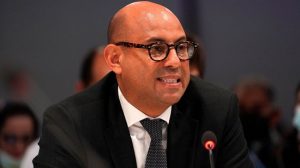As climate change increases the frequency and intensity of extreme weather events around the world, early warning systems (EWS) can save lives and livelihoods. The June 2024 UN Climate Meetings in Bonn brought together experts to discuss how innovative technologies can boost risk-informed adaptation and climate resilience.

Technology plays a crucial role in enhancing risk knowledge, strengthening EWS, and informing climate development and investment policies, particularly in vulnerable regions.
A side-event on technology, convened during the June Meetings by the UNFCCC Technology Executive Committee (TEC) and the UNEP Climate Technology Centre and Network (CTCN), focused on scaling up EWS globally and supporting the UN Secretary-General’s Early Warnings for All initiative, which aims to ensure that by 2027 every person on Earth is protected by EWS.
Cutting-edge technology like artificial intelligence, remote sensors and satellites can be used to analyse data, predict extreme weather events, and provide targeted alerts for communities at risk, among other things.
EWS will be greatly boosted by artificial intelligence, says UN Climate Change Executive Secretary, Simon Stiell.
“AI can offer remarkably precise foresight on imminent climate impacts and disasters,” he said at a recent meeting on climate and AI. “This could be instrumental in helping countries and communities prepare – providing real time information that saves lives and livelihoods on a massive scale. As we fight for an equitable and just transition, we need to make sure that these technologies are accessible to all.”
During the technology side-event, UN Climate Change Senior Director, Daniele Violetti, emphasised that nearly 50 percent of countries have included early warning systems in their national climate plans (known as Nationally Determined Contributions or NDCs), and that one in four prioritise enhancing technology and innovation.
Prioritising people-centred solutions
A policy brief on innovation for risk knowledge is being developed by TEC and the Group on Earth Observations (GEO) and will be launched later this year. TEC Chair Thibyan Ibrahim noted that the brief highlights the importance of context-specific technology and locally led, people-centred solutions.
Location-based messaging, for example, can help communities receive targeted warnings directly on their phones, ensuring they have the information they need to protect people and livelihoods ahead of extreme weather events. Similarly, real-time monitoring can empower residents to take swift community action and build resilience.
The Maldives – the first country to launch a roadmap for achieving Early Warnings for All – serves as a key example. Gaia Righini, from the Italian National Agency for New Technologies, Energy and Sustainable Economic Development (ENEA), noted how improved monitoring networks, supported by Italy, have strengthened the Maldives Meteorological Service since 2017.
However, in vulnerable regions, deploying innovative technologies remains challenging. Lack of funding, insufficient technical expertise, and inadequate infrastructure can significantly hinder progress. Overcoming these barriers is crucial to achieving the UN Secretary-General’s vision of Early Warnings for All.
Fostering collaboration
Anne Rasmussen, lead negotiator for the Alliance of Small Island States (AOSIS), emphasised the challenges remote island communities face in accessing modern technology. She stressed the importance of integrating traditional knowledge with scientific data to improve EWS effectiveness, and the need for international cooperation to better prepare Small Island Developing States (SIDS) for climate-related disasters.
A significant part of the side-event focused on the need to scale up technologies for climate information and early warnings in Least Developed Countries (LDCs), and to address global disparities accessing disaster risk data, especially in LDCs and SIDS. Insights from the discussions will feed into the joint policy brief under development by TEC and GEO.
Ambrosio Yobanolo, co-lead of the TEC Activity Group on EWS, and Fred Onduri, CTCN Advisory Board Chair, concluded the event by stressing the need to stay abreast of the latest technologies, strengthen collaboration among stakeholders, and leverage EWS to create more resilient and climate-adaptive communities.
